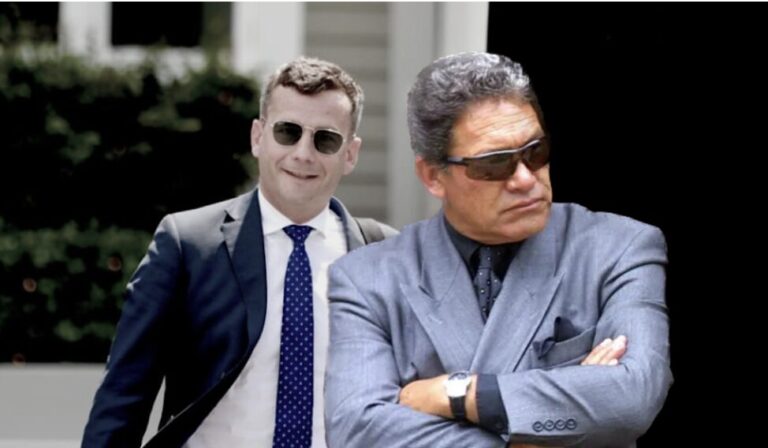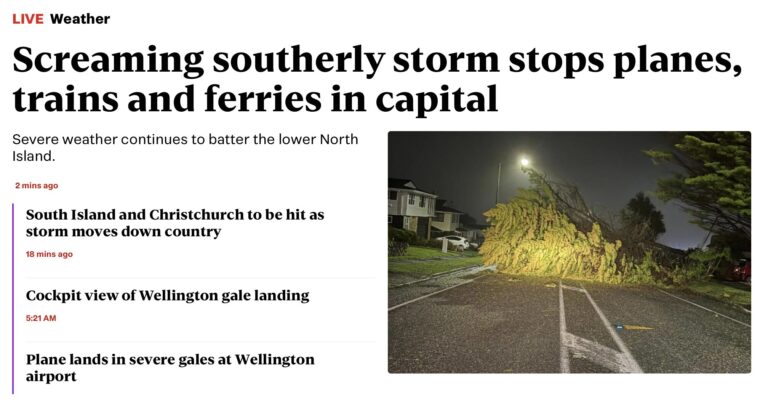The Ships From The North: Why Autarky cannot be New Zealand’s answer to Climate Change
DAILY BLOG EDITOR, Martyn Bradbury, warned his readers recently that Climate Change mitigation is now Aotearoa-New Zealand’s only viable option. Reversing the steady rise in global temperatures may have been possible if the largest industrial powers had taken action fifty years ago. Tragically, they refused to make the necessary changes, and now it is far too late. Accelerating Climate Change is already upon us, and its effects are only going to get worse.
The “loose affiliation of millionaires and billionaires” (to borrow Paul Simon’s superb phrase) who actually run this planet know that it is far too late to save industrial civilisation as we know it. Their weird preoccupation with spacecraft and interplanetary travel betray this grim realisation.
They want to leave the mess they have made behind them, spreading the deadly virus of ruthless environmental exploitation across the universe. All nonsense, of course. There is nowhere in our solar system where human-beings could establish a remotely sustainable colony, and it is doubtful whether the technology required for inter-stellar travel will ever be invented. Physics is physics – and the physics says “No.”
All of which raises the question: “Can we live with Climate Change?” Right here, in Aotearoa-New Zealand, is it possible to construct an economy and a society capable of sustaining a population of five million? Is autarky a serious option?
For those unfamiliar with the term: “Autarky is the characteristic of self-sufficiency, usually applied to societies, communities, states and their economic systems.” (Wikipedia)
Only the Māori can speak authoritatively about the sort of economy and society produced by living self-sufficiently in Aotearoa. From the beginning of the fourteenth century, until the late-eighteenth century, the inhabitants of these islands lived entirely without outside contact or assistance. All production of food, tools and medicines was internal, as was the trading of goods and services. For roughly five hundred years, in a multitude of small communities, Māori lived entirely alone in these islands at the bottom of the world. At any given moment between 1300CE and 1800CE, however, it is generally agreed that the combined population of these isolated human communities never exceeded 150,000 individuals.
Could we expect to do better? Our first impulse is to say “Of course!” But a little careful thought should be enough to dampen our optimism. New Zealand, as we know it, would be impossible without the existence of a rudimentary global transportation and trading system. Should Climate Change fundamentally weaken the industrial societies of the Northern Hemisphere, the supply-chains upon which New Zealanders depend would become increasingly disrupted. How long could our society endure if the ships from the North stopped coming?
Now, at this point many Kiwis will interject that New Zealand is one of the world’s most efficient food producers – so at least we won’t starve. The truth of the matter, however, is that New Zealand really isn’t that productive agriculturally. Without the fertiliser we dug out of Nauru, and which we now import from the Kingdom of Morocco, the grass upon which our entire primary production sector depends would fail us. Those ships from the North are indispensable to our well-being.
Not the least important items upon all those cargo manifests are the pharmaceuticals that keep the world’s deadly diseases at bay. Currently, New Zealand possesses no pharmaceutical production facilities worth speaking of. So, if the ships stop coming, then tens-of-thousands will die for lack of the medicines we currently take for granted.
Among the first priorities of a self-sufficient Aotearoa-New Zealand would, therefore, be the creation of a basic pharmaceutical industry. The use of the word “basic” is entirely deliberate, because in a world economy significantly disrupted by the intensifying effects of Climate Change, acquiring the highly sophisticated technology needed to produce anything other than the most simple medicines would become increasingly difficult – if not impossible.
This problem: of laying our hands upon vital machinery, and the machinery parts required to keep it running; can only get worse and worse.
If you’ve ever wondered at the images of dilapidated tanks, rusted and overgrown, in desolate Third World landscapes, then you have already encountered the paradox of “parts”. Tanks are extraordinarily complicated machines, always breaking-down. If the replacement parts required to keep them running become unavailable, then these terrifying fighting machines become completely useless – mere scrap-metal.
What is true of tanks is, of course, also true of John Deere tractors, and all the other agricultural equipment that make New Zealand cockies so productive.
This problem should give serious pause to all those who argue that, in order to prevent these islands being over-run by climate refugees, we will need to arm-up to a degree not before seen in our history. Defence spending, they say, will have to go up – by a lot. But, unless we intend (unrealistically) to create a large, vertically integrated arms manufacturing industry, the “Fortress New Zealand” argument makes no sense.
Any country which arms-up immediately makes itself militarily and diplomatically dependent upon the nation state supplying it with weapons.
Just think about acquiring that most basic of military tools, the automatic rifle. Once the shooting starts, a nation’s stockpiled ammunition soon runs out. What does it do then? Basically, it begs its arms supplier for more. If, for some reason, the US, or the UK, or Australia, tells New Zealand “No.” Or, more likely: “Sorry, mate, we can’t spare any at the moment”, then those automatic rifles instantly become nothing more than expensive metal clubs. Obviously, if the weapons your nation is seeking are fighter aircraft or warships, then the supply and maintenance problems are magnified a thousand-fold.
“Fortress New Zealand” is a pipe-dream – unless, of course, we allow ourselves to become a fully-fledged colony of the USA or Australia (the most likely option, if only from a geographical perspective) or, maybe, China. Even then, the whole survival scenario rests upon the assumption that the arms-bearing ships from the North keep coming.
The anthropologists tell us that, for a little while after the first Polynesian voyagers made landfall on these islands, the great ocean-going canoes that had carried them here went back and forth between Aotearoa and their Pacific island homelands. Eventually, however, the canoes from the North stopped coming. The men and women who had arrived on these, the last sizeable land-masses to succumb to human occupation, were finally and entirely alone.
Until new sailing vessels arrived from the North.
If those ships hadn’t arrived, “Aotearoa” would have survived. But, without its constant and extensive connections with the rest of the world: the very connections most endangered by accelerating Climate Change; “New Zealand” cannot exist.







The correct name for this country is New Zealand. This country’s name has not been changed and New Zealand is the name that should be used. A name change should only come about through discussion and debate followed by a referendum. An example of this is the Cannabis Legalisation and Control Referendum and End of Life Choice Referendum which were voted on in the last election.
Please use the correct name in future.
I prefer Godzone.
Ireland was allowed to suffer dreadfully from starvation by its close neighbour the UK. I believe there was a famine one year and the UK enabled food to alleviate that. When it happened again the next year, their patience had run out. I think that there was an attitude of – they should have had a better plan and couldn’t expect to be rescued again. We have a relationship with Australia that is elastic, and need to be wary of being dependent on them. They have taken back some autonomy that Norfolk Island had which came with some aid. They would take us over if they could get advantage and changes to their great economy will happen.
Some very pessimistic views in some of the comments. Is it really likely that international trade and industrial societies will utterly cease?
Western nations have been trading across the great oceans continuously for 500 years, and for 350 years of that time it was all by sailing ships. There were no steam powered ships for the first 60 years of serious European contact with Maori (1800 to 1860) yet the rudiments of settlement and government were established during that time.
I can imagine a serious enough collapse (though extremely unlikely) that might put the frequency of contact back to the mid 20th century levels but even then trade was at the heart of our economy.
Even the collapse of the Roman Empire (probably the greatest calamity in Europe in the last 2,000 years) did not see Europe utterly sent back to the Bronze Age. In the fifth and sixth centuries, in the most difficult times, Christianity served to protect knowledge for the future.
Wayne people weree then not stripped of their local resources or had them poisoned by toxic tailings to the extent of today and that being round the world. The PTB have the ability to annihilate us all and the post today here of a Blunt Message to the World is an indication of what people of intellect and conscience are up against. Don’t be so comfortable and sit on your brains.
Just to make one point clear. I don’t support the Roman Empire as such, rather I was making the observation that in the last 2,000 years there has never been such a collapse of a continent spanning advanced civilisation. It was at least 200 to 300 years before Europe recovered the same level of technology and government.
In contrast WW1 and 2 did not remotely have the same level of disruption of our society. Even the two defeated countries fully recovered within 15 years. The US and USSR actually forged ahead.
It seems inconceivable to me that we will suffer something as dramatic as the fall of Rome. Not even the Black Death of the thirteenth century which killed a third of the population, was as disruptive. In fact it ended feudalism in much of Western Europe and spurred innovation.
Australia soars to 50 degrees for first time this century
https://www.weatherzone.com.au/news/australia-soars-to-50-degrees-for-first-time-this-century/535929
What is going to happen to NZ when the Aussies come to NZ and with their superior wages can easily buy up NZ and can get free welfare here as of right. We start getting more Tarrants as well as the 501’s. We already have a significant amount of China’s most wanted financial crooks living here.
Australia saw how NZ was going with lazy immigration and changed their immigration laws so that they were not left with dysfunctional Kiwis continuing to their shores,
NZ’s policy seems to be NZ wants as many high needs people with problems, who can’t cope and harm others, or have fraudulent paperwork as we can give residency too such as Ahamed Aathil Mohamed Samsudeen https://www.nzherald.co.nz/nz/auckland-mall-terrorist-forged-medical-documents-boasted-about-duping-immigration-officials/P4TXIN7YOI2OENGEKTWRCV2AD4/
NZ asleep at the wheel on decades of problems that are only going to get a lot worse that they turn a blind eye to.
A good explanation of the problem by Chris although he has neglected another solution proposed from the foundation of the world, given the behavior of the many religious groups over the history that we have recorded that is understandable although it also poses the question since there are many false religions could there be a true religion? I can understand that most of our secular society abhor the thought that we could be accountable to a higher power however any honest person has to admit that whatever view of the origin of all things we hold it is based in part on faith since we were not there at the beginning & are unable to demonstrate that all parts of whatever theory we believe can be reproduced.
There is one very big assumption in the posting.
That a central government will still exist. Where will the money be raised to allow a central government with all its centralised expenditure such as armed forces to repel the hoards and police to maintain a semblance of societal order?
And how will central government with no taxation keep the electricity grid (if replacement equipment could be found) operational?
Have said it before, the society we know today will fracture into feudal tribes (and not just Maori) and those tribes will compete for resources (food water and shelter).
Those who control the coal, the best arable lands, the best seashores, the best forests and maintain healthy livestock numbers, will prosper and can expect their tribal members to “defend” their patch. Those without will be on constant lookout to encroach on those boundaries.
Trade will happen but transport difficult. Sweet potato grown in Northland may be traded for Huntly coal however the tribes controlling the access between the two will make it difficult to trade.
Everything hinges on maintaining a central government, but can that government maintain control over society? Some would say it has already lost control and society is splitting into tribes as we speak.
I would say that government has strong backing going by the coviid response. The disaffected would soon majorly join the country in being a citizen, and we would have to deal with unreasonable demands and lawlessness from the rest. But being part of the majority of citizens would need to be shown as being worthwhile so that we have a semblance of real co-operative society, NZ made supported etc, a circular economy without most of our profits leaking away. Once we had houses, our own little place to work on and give us security and some autonomy. We need to find a way for citizens to get what they need, and a way to give back to strengthen our mateship. Old retired people would be expected to put in a few hours a week or help out at harvest time where still fit. We are a big cost to the country, but a few hours each a week at something we are skilled in would be invaluable.
Youngsters would do some farm work as a block course in their school year. Working years would start at fourteen. The era of keeping children separate from life while they learned is over. The computer is there, the jobs have changed, and it isn’t interesting being stuffed with facts when their future use is unknown. Making short term learning modules in different spheres with formal schooling interpolated and a sort of bar mitzvah in the teenage years similar to ‘coming out’ for girls as debutantes entering adulthood in the past would make education more worthwhile to the individual teenager.
I like the welfare state with room for individuality, but there must be reciprocity of a sort. Tougher times demand it in a nation that has a belief in its own fairness, goodness and practicality.
Yeah not convinced on this one Chris.
I agree the current “standard of living i.e consumption in New Zealand could not exist in such a scenario but a functional society and economy could very likely prosper with a little forward planning.
Pre colonial Maori may have been only able to sustain the small population you indicate but as with any indigenous culture that was due to the restrictions of the landscape, ecology, available resources and technology.
For example the suite of productive food species we know have in this country is exponentially larger than what pre colonial Maori had available. Many of those species we do not bother to grow at scale simply because we can’t compete on international markets but we can grow them.
Bananas are are classic example. We import 99%of our Bananas but they thrive anywhere from Raglan to Northland and many people grow them. Some are even developing plantations to service the internal market.
There are a plethora of other subtropical crops that thrive here that we do not produce commercially simply because the market is flooded with imported produce.
I’ve seen a study done in the 60s that identified parts of Northland as prime rice growing country.
Sugar cane also thrives in the north. It’s not only a food plant but is also grown around the world to provide liquid fuel.
Brazil literally powered its economy on sugar “fuel” in the 80s thanks to oil embargoes.
During WW2 sugar beet was grown here to supplement our reliance on imported oil and frankly there are many species we could be growing sustainably in unison with food crops that could be processed into carbon neutral liquid fuel if, but more like when we need to.
Instead we simply grow milk powder.
As for fertiliser we are still in the lineal mindset of the extract, consume, extract more mentality. Resources such as Phosphorus don’t simply disappear once used. Nature cycles them. It’s our lineal systems of consumption that inefficiently disperses those resources.
Kiwis landfill something like 1.8bn tonnes of food waste annually. Plenty of fertiliser going to waste there and that doesn’t even take in crop waste, forestry waste or dare I say it the enormous tonnage of manure that could be safely returned to the soil if we bothered to try
So when it comes to food and potentially energy there are plenty of options.
Science and tech. NZ manufactured a huge variety of consumer durables prior to the glorious economic reforms of the 80s and we are still innovating in this space.
We just dont compete on the global stage anymore thanks to those glorious economic reforms of the 80s
But if we look around the world Cuba’s is an excellent example of what a small isolated country can do when the need arises. They have developed one of the best healthcare systems in the world….again under embargo
Personally I’m not into the idea of Autarky but we could easily maintain a functional and productive standard of living if we engaged in a little forward thinking and planning before the boats stop coming.
Arguably it’s what we should be doing anyway given the issues the globalised world faces. Unfortunately our leadership is more interested “cowtowing” to the all encompassing neoliberal global fantasy than actually putting our house in order.
The future will have significant challenges but they are not insurmountable….as long as we can step outside of that neoliberal mindset
If you can’t invade, then you have to know how to trade.
I think that one of the most useful changes we can make is to insist that politicians have some farming experience and have studied Keynes and understand stagrflation, and dod some humanities and debating in these subjects and have passed in the papers. Then they have to leave Parliament after three terms, which will enntitle them to superannuation on retirement, at a reaonable rate and some travel perks, and quango jobs. They manage to coalesce in government and stick like chutty to the sole; too long in the green room and they lose any soul they had, too often..
Arguably we will need at least 6 frigates to maintain access with the rest of the world moving forward. Just to side step blockades.
It’s not enough to have military craft alone and it’s not enough to have civilian craft alone.
Having a strong navy assures access to markets.
Lucky in climate change, NZ governments like to give our water and resources away and sign trade agreements that allow this! Sarcasm.
3 Waters makes it convenient to sell it all off in one go by either this government or the next as NZ ‘runs out of money’.
China Is Running Out of Water and That’s Scary for Asia
Of all Bejing’s problems — demographic decline, a stifling political climate, the stalling or reversal of economic reforms — dwindling natural resources may be the most urgent.
https://www.bloomberg.com/opinion/articles/2021-12-29/china-s-water-shortage-is-scary-for-india-thailand-vietnam
NZ Sand is also a winner to sell off.
Sand mining: the global environmental crisis you’ve probably never heard of
https://www.theguardian.com/cities/2017/feb/27/sand-mining-global-environmental-crisis-never-heard
Wouldnt it be nice if the monetary system [or call it what you might] was somehow based on physics.
If we look at what has happened with huge costs and debts with the supercity which was centralising councils, imagine the bills and water costs generated by 3 waters….
“There are now more than 12,000 staff at Auckland Council. Since the Super City was created, the payroll bill has more than doubled and is running just shy of $1 billion a year. One in every four staff members earns more than $100,000 per annum. Middle management overkill. Scandalous.”
https://www.nzherald.co.nz/nz/greg-sayers-troubling-trends-emerging-at-debt-laden-auckland-council/FGPSYVHQDI3FV337FTWEBOUGIE/
Natz and Act wanted the Supercity but no excuse for the power grab by Labeen for water. Just stop water exports and asset sales in NZ and tighten up the legislation so that it is fair and our water is not being given away for golf courses and water bottling. 3 waters just makes existing issues worse and more expensive. Same with the polytechnic centralisation, doesn’t help students and citizens, it makes it worse by ballooning out administration costs.
A total elimination of shipping would certainly reduce our standard of living, though unemployment would become a distant memory. However a massive reduction over a period of time as we rebuilt the industries we once had, and some more to catch up with technology and we could carry on quite happily . Maybe more so than now. Globalisation as an essential component of neoliberalism has resulted in a huge wast of energy sending stuff backwards and forwards across vast ocean distances to expedite paper profits that actually only show a profit by the exploitation and manipulation of currency exchange rates.
Wages are paid in many countries to people who do survive on them, that by exchange into NZ dollars no one could possibly survive, so the exchange rate in manifestly false.
If this were not so shipping internationally would shrink to a sustainable level automatically.
D J S
I agree. Although difficult it need not that be way in the future. There is also aclarge supply of phosphate under the water in the Chatham rise that could become accessible soon.
Since every action in an industrial society involves the conversion of fossil fuel of some kind into carbon dioxide -either directly or indirectly- it naturally follows that the CO2 burden of the atmosphere will continue to increase until the use of fossil fuels ceases. And even when humans stop burning fossil fuels the atmospheric CO2 burden will probably continue to increase because positive feedbacks -such as the release of carbon dioxide and methane from permafrost- have already been triggered
After the collapse of industrial civilisation, due to overheating and resource depletion, the Earth will continue to overheat, until the point is reached at which it is too hot for humans to exist anywhere, i.e. humanity is instigating its own extinction.
Between now and the point of collapse, fascistic governments (working as agents for banks and corporations) will pretend to care about the health and welfare of the populace whilst forcing on the populace policies that make everything worse faster.
Rather than acknowledge ANY fundamental truth, the fascistic governments that now dominate the world -including NZ’s very own LINO- will promote ‘solutions’ that make matters worse faster -such as the various ‘carbon trading’ scams, electric cars, wind turbines etc. – and will continue to pour public money into infrastructure that will have no utility whatsoever in the very near future. And will continue to lie to the masses about everything.
5 Eyes psychology underlies this post-the NZ default position on just about anything is the Anglosphere.
But, there is an alternative-a rejuvenated Non Aligned Nations movement. Mutually beneficial bilateral trade and cultural agreements with the myriad of smaller countries. Cuba has an advanced medical and pharmaceutical capacity, India is a major drug producer.
Fortress NZ would involve major capacity building and a retreat to earlier modes of social organisation (with smart phones?)
If there is one constant at least in written human history, it’s someone somewhere telling us the world is going to end. Badly!
And no, I do not think we need to revisit the stone age either. Bike lobby groups may disagree however or at least their preferred early medieval period.
That mindless pessimism aside, I do agree the equally mindless running down of New Zealand’s ability to manufacture things here thanks to neo liberalism and globalism is a continuing blight on the security of this country and we are seeing it now. Example, try and buy furniture from somewhere as common Australian firm Freedom Furniture. Their model is to have their goods manufactured in China or some other exploitable third world country. But covid plus places like China throwing tantrums at Australia and refusing to buy the very fuel used to power their industries has led to these goods not being made. Add to that a global shipping cartel that us ripping off every customer whilst simultaneously turning unreliable to boot and you can see where the future lies. Freedom Furnitures model is stuffed! It’s needs local manufacture and it needs it now. But those skills are simply not there.
I’m waiting for that dinosaur Richard Prebble to do a mea culpa in the Herald and admit that he and his fellow blind idealogue politicians of the day got it wrong. But I am guessing the furniture I once ordered months ago will finally arrive before that. Or hell will freeze over!
Good comment. We could train our own people to make all this stuff and we should start asap. We are not dumb. As always Neo Liberalism is in the way and stops all progress towards Autarky. A revolution will be required by the looks of it to rid the world of this scourge. I wish the anti vaxxers and all the hangers-on would protest about Neo Liberalism, instead of Te Virus.
Neoliberilism has nothing to do with this, ditto the AV brigade. You want self sufficiency then start with yourself.